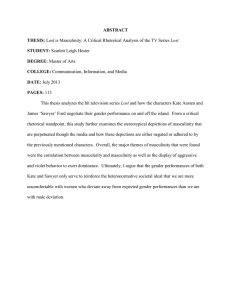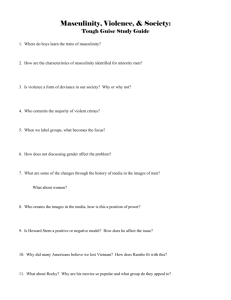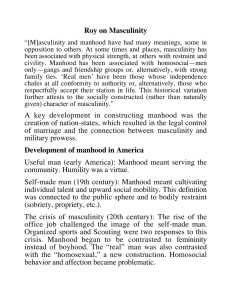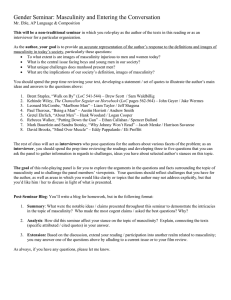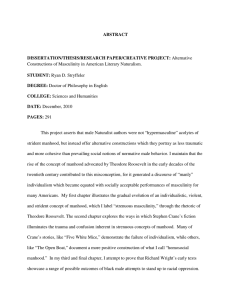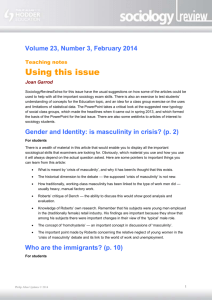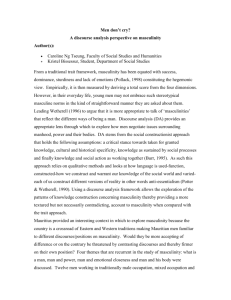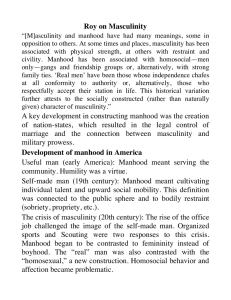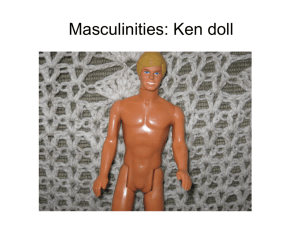Masculinity in American Christianity: Recent ... Conflicting Directions
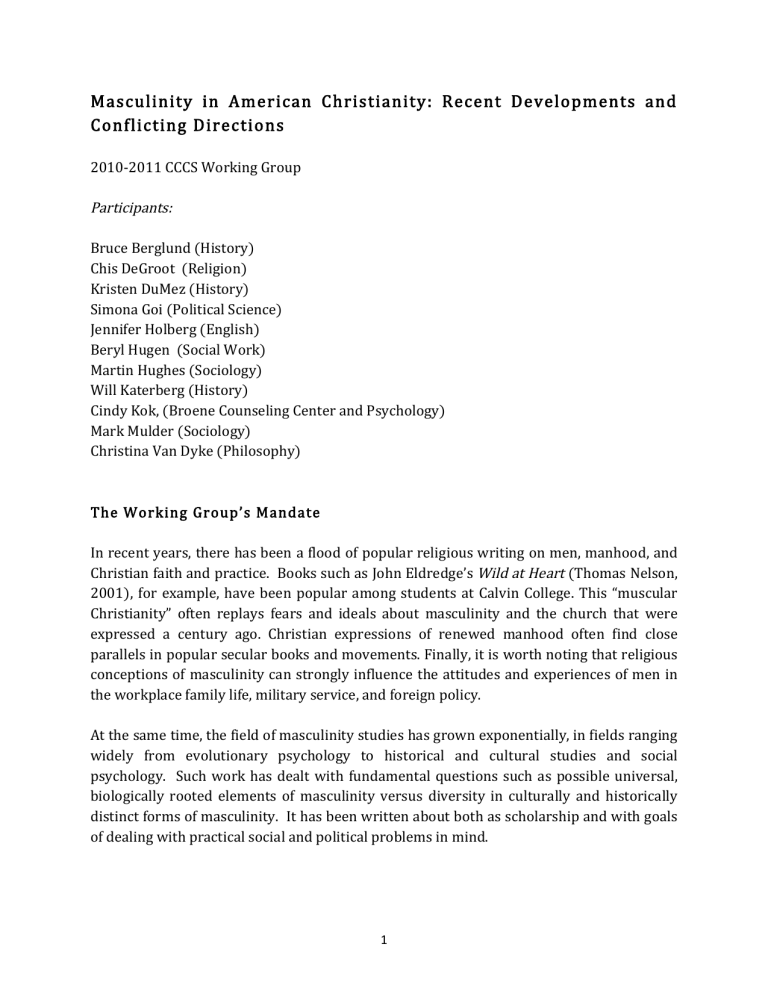
Masculinity in American Christianity: Recent Developments and
Conflicting Directions
2010-‐2011 CCCS Working Group
Participants:
Bruce Berglund (History)
Chis DeGroot (Religion)
Kristen DuMez (History)
Simona Goi (Political Science)
Jennifer Holberg (English)
Beryl Hugen (Social Work)
Martin Hughes (Sociology)
Will Katerberg (History)
Cindy Kok, (Broene Counseling Center and Psychology)
Mark Mulder (Sociology)
Christina Van Dyke (Philosophy)
The Working Group’s Mandate
In recent years, there has been a flood of popular religious writing on men, manhood, and
Christian faith and practice. Books such as John Eldredge’s Wild at Heart (Thomas Nelson,
2001), for example, have been popular among students at Calvin College. This “muscular
Christianity” often replays fears and ideals about masculinity and the church that were expressed a century ago. Christian expressions of renewed manhood often find close parallels in popular secular books and movements. Finally, it is worth noting that religious conceptions of masculinity can strongly influence the attitudes and experiences of men in the workplace family life, military service, and foreign policy.
At the same time, the field of masculinity studies has grown exponentially, in fields ranging widely from evolutionary psychology to historical and cultural studies and social psychology. Such work has dealt with fundamental questions such as possible universal, biologically rooted elements of masculinity versus diversity in culturally and historically
distinct forms of masculinity. It has been written about both as scholarship and with goals of dealing with practical social and political problems in mind.
1
Despite these trends, there is as yet relatively little scholarly work on the concept and lived experience of masculinity in relation to Christianity, and more specifically scholarship done from within the viewpoint of the Reformed tradition. Though they have gathered a great deal of attention, the theological, scientific cultural-‐historical foundations of popular books on Christian manhood usually are highly questionable. More serious examination of masculinity in light of Christian doctrine, Biblical teaching, and disciplines such as biology, psychology, sociology, social and cultural history, philosophy, and gender studies are
needed, both for scholars and for Christian readers as individuals and in church groups.
With these issues in mind, our working group met and discussed a series of books and essays with the goal of sustained engagement with the existing literature that connects this
aspect of gender with Christian thought, living, and engagement with society and culture.
Reading Suggestions
The material listed below includes both material we read and other readings suggested by participants in the process of putting together our reading list. It is a very modest entry point into a huge scholarly and popular literature that includes historical and cultural studies, biblical studies and theology, work by sociologists, psychologists, and biologists, and more. These readings are not overly technical, for the most part, and are appropriate
for a general undergraduate university educated audience. Books we read in whole or part are noted with an asterisk.
General:
* Mary Stewart Van Leeuwen, My Brother’s Keeper: What the Social Sciences Do
(And Don’t) Tell Us About Masculinity (IVP, 2002).
Van Leeuwen’s book is one of many she’s written for general Christian audiences that synthesizes material from the sciences, social sciences, humanities, and biblical studies. It’s a book general introduction to the
variety of interconnected issues related to Christian faith and masculinity in the United States.
Religious Studies:
* Stephen B. Boyd, W. Merle Longwood, Mark W. Muesse, eds., Redeeming Men:
Religion and Masculinities (Westminster John Knox Press, 1996).
2
The essays in this collection take a comparative religious studies approach to issues related to masculinity and manhood. Like most edited collections of this sort, it includes essays from people of a variety of religious backgrounds
(though mostly varieties of Christianity) and scholarly and non-‐scholarly perspectives. Some of the essays are more scholarly analysis, some more proscriptive.
History and Cultural Studies:
* Michael Kimmel, Guyland: The Perilous World Where Boys Become Men (Harper,
2008).
This book is a piece of popular social criticism, one that addresses the often corrosive world in which boys grow up and become men today. As such, it reads on occasion as over-‐heated and lacking nuance. But it does offer some useful insights on factors that leave young men, from a variety of cultural backgrounds, ill-‐equipped to succeed in school, careers, and family life. If you go to the Amazon page for the book, you’ll see the strongly critical and supportive comments it generated among readers. It did the same in our
discussion group.
Michael Kimmel, Manhood in America: A Cultural History , Third Edition (Oxford
University Press, 2011),
This is a good survey history of manhood in the United States, paying attention to both ideas about manhood, especially popular ideas, and to the actual social circumstances in which men lived.
Bethany Moreton, To Serve God and Wal-‐Mart: The Making of Christian Free
Enterprise (Harvard University Press, 2009).
This history of Walmart addresses a variety of topics. A blurb for the book says: “In the decades after World War II, evangelical Christianity nourished
America’s devotion to free markets, free trade, and free enterprise. The history of Wal-‐Mart uncovers a complex network that united Sun Belt entrepreneurs, evangelical employees, Christian business students, overseas missionaries, and free-‐market activists. Through the stories of people linked by the world’s largest corporation, Bethany Moreton shows how a Christian service ethos powered capitalism at home and abroad.” It’s listed here because several chapters explore how the ideal of “servant leadership,”
3
modeled on Christ, helps many men in low to mid-‐level management reconcile work in a post-‐industrial “service economy” with ideals manhood that emphasize independence and patriarchy. It can help to make the connection between how men’s lives are being transformed at home and
work even as traditional ideals continue to be influential.
* George L. Mosse, The Image of Man: The Creation of Modern Masculinity (Oxford
University Press, 1998).
Mosse’s book is an intellectual history of the cultural of masculinity in Europe since the eighteenth century. It is helpful for understanding how ideas about manhood have changed and evolved in the past three centuries. But it is intellectual history and pays limited attention to actual social practices of men.
Social Sciences:
Tanya Erzen, Straight to Jesus: Sexual and Christian Conversions in the Ex-‐Gay
Movement (University of California Press, 2006)
This ethnographic study examines a ministry to gay men who believe that homosexuality is a choice to be overcome. The men who go to the ministry typically come from conservative Christian backgrounds and struggle with their sexual desires and religious convictions. It includes some history of the ex-‐gay movements (including Exodus International) but focus on a small organization in California and the men who seek it out. The goal of the New
Hope ministry is to “rebuild masculinity.” Tanzen avoids the politics of the issues and focus on the experiences of the men and the ministry, trying to understand them on their own terms.
R. Marie Griffith, God's Daughters: Evangelical Women and the Power of Submission
(University of California Press, 200).
This book is not about masculinity, of course. It examines Women’s Aglow
Fellowship, an inter-‐denominational, international evangelical women’s spirituality organization. But it pairs well with Wilcox’s study, examining the
mirror side of the ideal of patriarchy, submission, similarly exploring the complex negotiations in day to day life in putting the ideal into practice.
4
* W. Bradford Wilcox, Soft Patriarchs, New Men: How Christianity Shapes Fathers and Husbands (University of Chicago Press, 2004).
This is a monograph based on a dissertation. It examines contemporary evangelical and mainline Protestant ideas associated with the “nuclear” family and the role of fathers in families—e.g., in the Promise Keeper’s movement. It also uses social scientific survey data and detailed case studies of particular families to look at actual practices in family life. Wilcox argues that mainline Protestant men are "new men" who take a more egalitarian approach to the division of household labor than their conservative peers and a more involved approach to parenting than men with no religious affiliation. Evangelical Protestant men, he says, are "soft patriarchs"—not as authoritarian as some would expect, and given to being more emotional and dedicated to their wives and children than both their mainline and secular counterparts. He argues that religion domesticates men in ways that make them more responsive to the aspirations and needs of their immediate families.
More Readings, from Academic Journals, Recommended by Working Group
Members
John, P. Bartkowski, “Breaking Walls, Raising Fences: Masculinity, Intimacy, and
Accountability among the Promise Keepers,” Sociology of Religion , Vol. 61, No. 1,
(Spring, 2000), pp. 33-‐53.
Brian Donovan, “Political Consequences of Private Authority: Promise Keepers and the Transformation of Hegemonic Masculinity,” Theory and Society , Vol. 27, No. 6
(Dec., 1998), pp. 817-‐843.
Sally K. Gallagher and Sabrina L. Wood, “Godly Manhood Going Wild?:
Transformations in Conservative Protestant Masculinity,” Sociology of Religion , Vol.
66, No. 2 (Summer, 2005), pp. 135-‐159.
Melanie Heath, “Soft-‐Boiled Masculinity: Renegotiating Gender and Racial Ideologies in the Promise Keepers,” Gender and Society , Vol. 17, No. 3 (Jun., 2003), pp. 423-‐
444.
Christina Kwauk, “Goal! The Dream Begins: Globalizing an Immigrant Muscular
Christianity,” Soccer and Society , Vol. 8, No. 1, January 2007, pp. 75-‐89.
5
Books on Masculinity for Lay Christian Audiences that Motivated the
Reading Group
Herbert Anderson, Jacob’s Shadow: Christian Perspectives on Masculinity (Bridge
Resources, 2002)
Paul Coughlin, No More Christian Nice Guy: When Being Nice—Instead of Good—
Hurts Men, Women and Children . (Bethany House, 2005)
John Eldedge, Wild at Heart: Discovering The Secret of a Man's Soul (Thomas
Nelson, 2001)
Elizabeth Elliot, The Mark of a Man: Following Christ’s Example of Masculinity
(Baker Bookhouse, 2006)
Xan Hood, Untamed: Becoming the Man You Want to Be . (NavPress, 2006)
Eric Ludy, God’s Gift to Women (Multnomah Books, 2003).
Kevin McCollough, The Kind of Man Every Man Should Be (Harvest Publishers,
2008).
Tim Reiter, Strong Enough to Be a Man: Reclaiming God’s Plan for Masculinity
(Beacon Hill Press, 2005)
6
